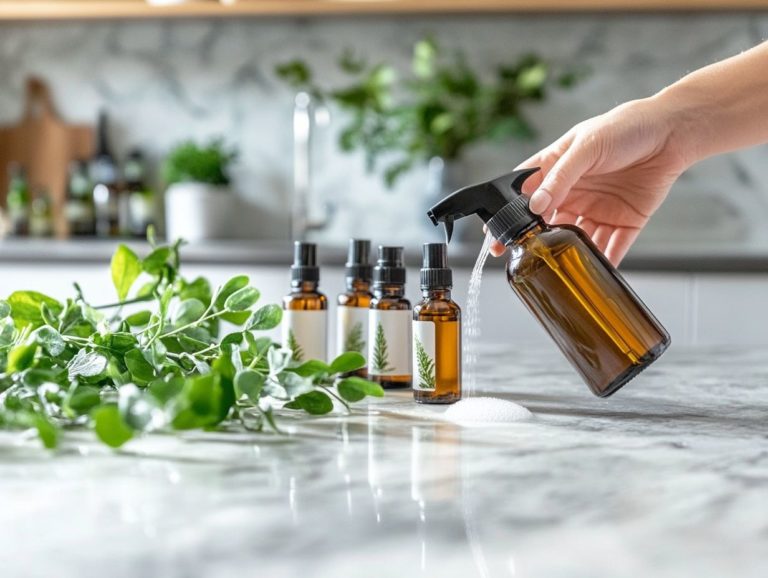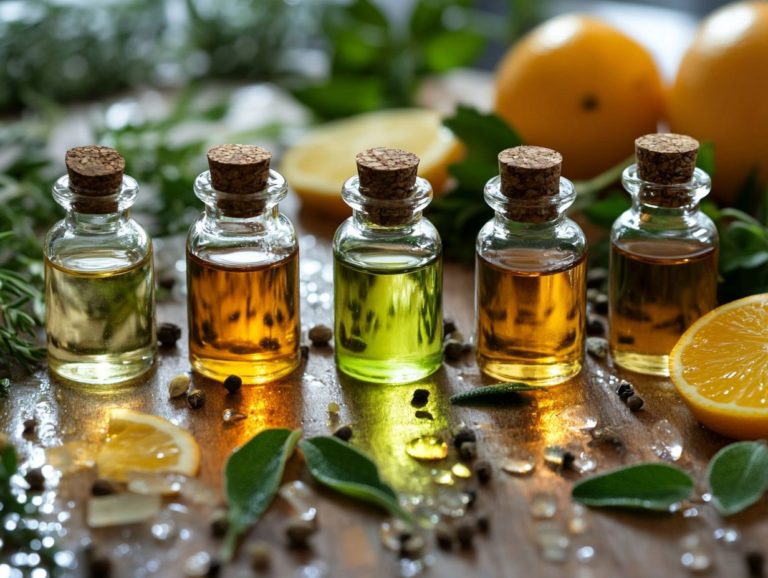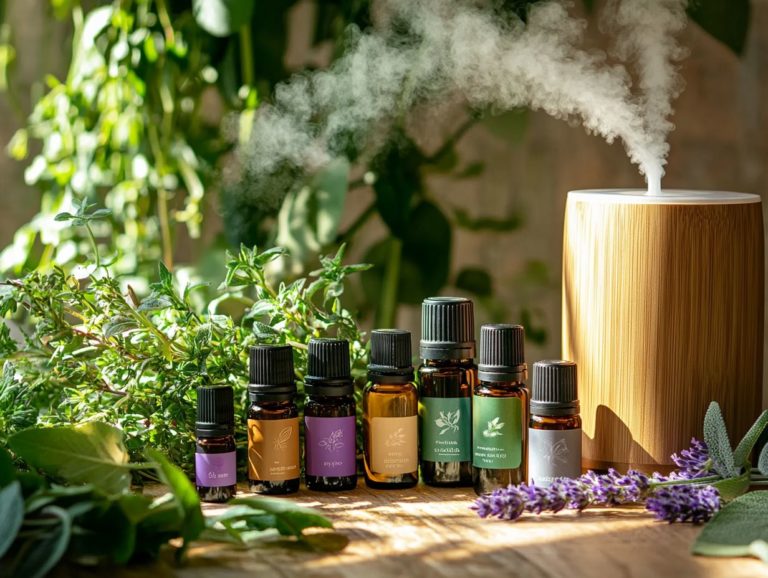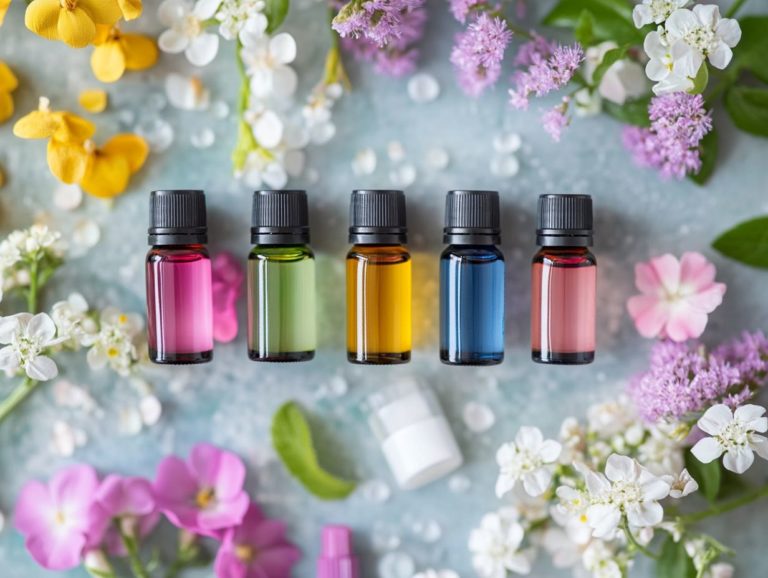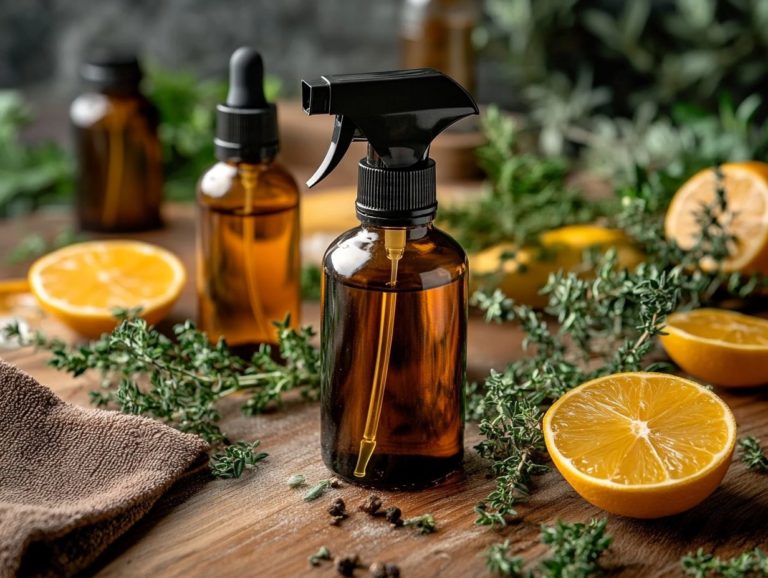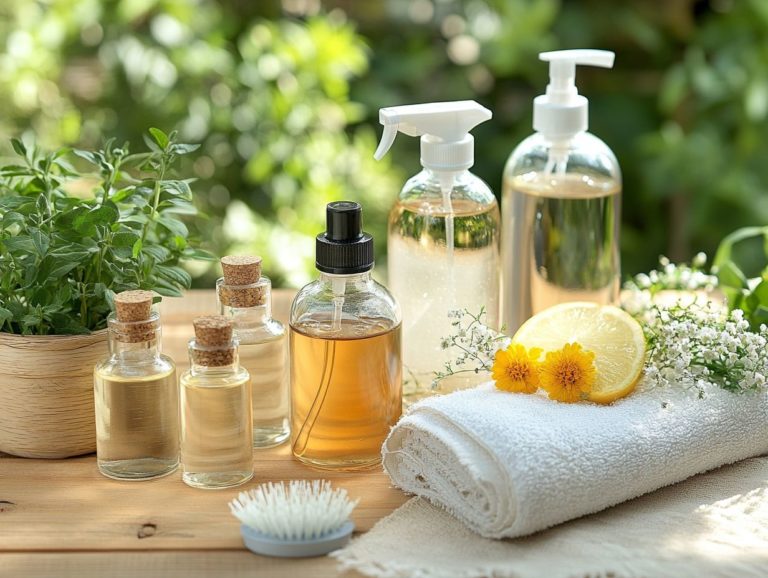How to Use Essential Oils in Your Cleaning Routine
Essential oils have emerged as sought-after natural alternatives for cleaning, providing delightful aromas along with a host of health benefits, including addressing seasonal allergies and other health concerns.
In this article, you will explore the world of essential oils, uncovering their advantages for maintaining a clean home and discerning which ones are best suited for your personal space, including pet-safe options.
Unveil the most effective scents that create a refreshing environment, and discover which oils boast antibacterial, antifungal, and antiviral properties, along with the best essential oil blends for household cleaning.
You will also find guidance on safely weaving these oils into your cleaning routine. This includes essential oil recipes and DIY cleaning tips.
Unlock the incredible power of nature to transform your home with pure essential oils and natural cleaning products!
Contents
- Key Takeaways:
- What Are Essential Oils?
- Why Use Essential Oils in Cleaning?
- How to Choose the Right Essential Oils for Cleaning?
- How to Use Essential Oils in Cleaning?
- Are There Any Safety Precautions When Using Essential Oils in Cleaning?
- Frequently Asked Questions
- Are essential oils a good fit for my cleaning routine?
- How do I use essential oils in my cleaning routine?
- Which essential oils are best for cleaning?
- How much essential oil should I use in my cleaning solutions?
- Are essential oils safe to use around children and pets?
- Can I use essential oils on all surfaces?
Key Takeaways:
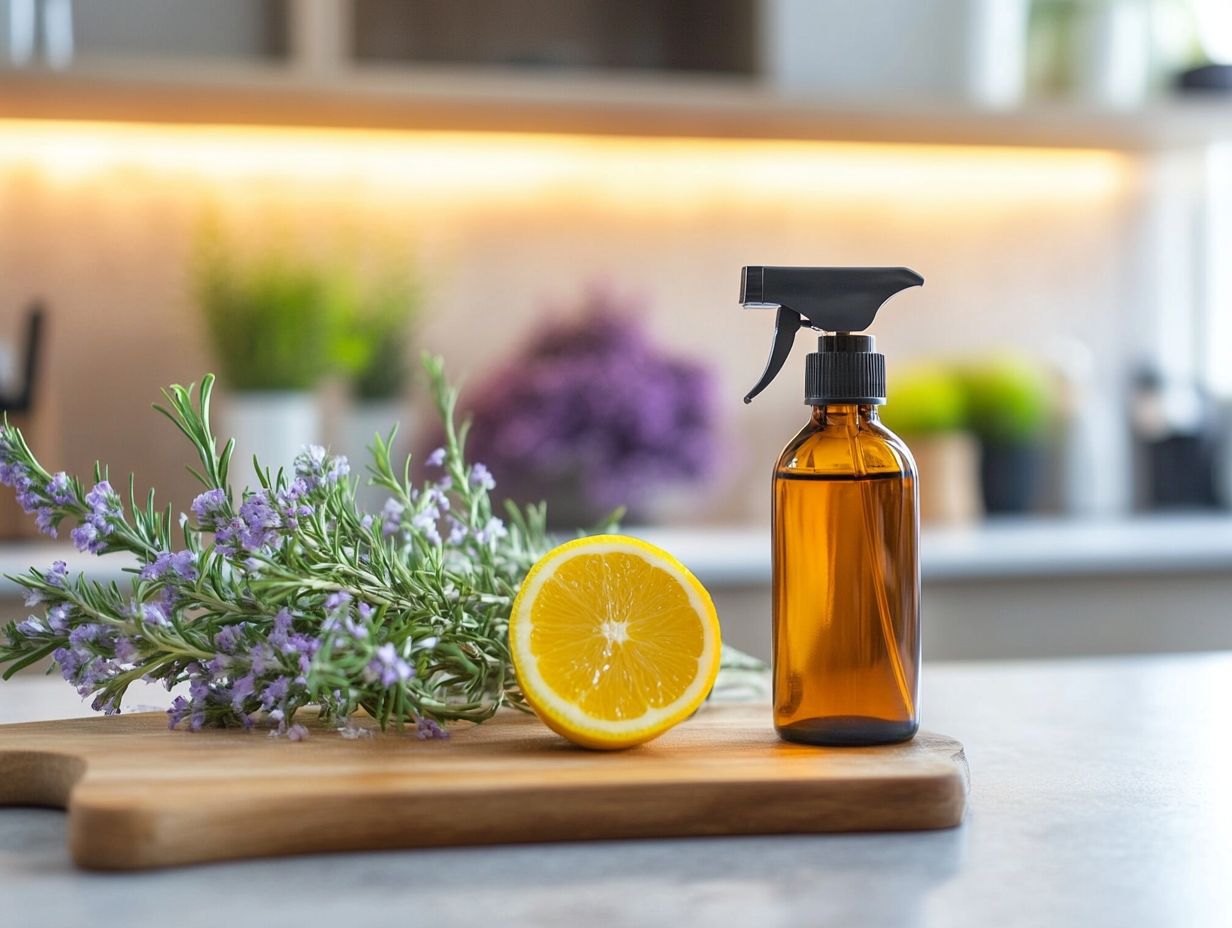
- Essential oils have many benefits for cleaning, including antibacterial, antifungal, and antiviral properties.
- To choose the right essential oils for cleaning, consider using scents like lemon, tea tree, and eucalyptus.
- Use essential oils in various cleaning recipes, such as all-purpose cleaner and air freshener, but be cautious of safety precautions, proper dilution, and ensuring they are pet-safe.
What Are Essential Oils?
Essential oils are strong plant oils extracted from the leaves, flowers, and roots of plants, utilizing methods like pressing and distillation. You ll find that these oils are renowned not only for their captivating aromas but also for their therapeutic properties and potential everyday applications, ranging from cleaning to aromatherapy and addressing health concerns.
The journey of essential oils has culminated in a diverse selection of brands like AromaForce, Aura Cacia, Now, and Pure Essences, with formulations readily available in health food stores. This makes them a favored choice for those like you who are seeking natural solutions to elevate well-being and uplift mood.
Why Use Essential Oils in Cleaning?
Incorporating essential oils into your cleaning routine offers a wealth of benefits, from their natural antibacterial properties to their enchanting fragrances and non-toxic nature, positioning them as superior alternatives to harsh chemical cleaners. Using organic essential oils and diluted oils can help you get the most out of these oils.
As you explore the use of essential oils, you ll find they not only help eradicate germs but also infuse your home with a refreshing ambiance.
By weaving these powerful plant extracts into your DIY cleaning solutions, you create a personalized and eco-friendly method for maintaining your household, ultimately supporting the health and well-being of both you and your pets while reducing exposure to harsh chemicals.
What Are the Benefits of Using Essential Oils in Cleaning?
The benefits of using essential oils in your cleaning routine are numerous and impactful. They not only offer antibacterial properties that help eliminate germs but also fill your home with delightful scents that can uplift your mood. Essential oils like lavender, lemon, and tea tree are renowned for their therapeutic properties, contributing to a chemical-free and eco-friendly cleaning environment. This natural approach fosters a healthier living space and supports your emotional well-being, transforming cleaning into a more enjoyable experience.
Adding these oils to your cleaning routine can make your home feel more peaceful, as many of them possess calming effects that help reduce anxiety and stress. For example, citrus oils like lemon not only act as powerful disinfectants but also invigorate your mind, crafting a refreshing ambiance.
By choosing essential oil-infused products, you actively minimize your exposure to harsh chemicals commonly found in commercial cleaners, which can lead to long-term health benefits. This holistic method of cleaning aligns beautifully with a sustainable lifestyle, enhancing both your physical and mental health. Opt for pure essential oils available at health food stores to ensure quality and efficacy.
Try incorporating essential oils into your cleaning routine today to immediately improve your home environment!
How to Choose the Right Essential Oils for Cleaning?
When selecting the ideal essential oils for your cleaning endeavors, it s essential to weigh several factors, including their safety, efficacy, and the specific cleaning tasks you have in mind.
Considerations such as whether the oils are safe for pets and their therapeutic properties can profoundly impact your choices. Additionally, the ambiance they create plays a significant role.
Renowned brands like AromaForce, Aura Cacia, Now, and Pure Essences provide an extensive array of essential oils. This enables you to blend delightful scents while reaping their benefits for your household cleaning routines, all while cultivating an inviting atmosphere.
Discover the Best Cleaning Scents!
The finest scents for cleaning often originate from essential oils celebrated for their refreshing and invigorating qualities think lemon, tea tree, lavender, eucalyptus, and orange.
These delightful aromas don t just banish odors and elevate your space; they also boast antibacterial and antifungal properties that make them powerhouse cleaning agents. By weaving these oils into your cleaning routine, you can significantly enhance both the efficacy and enjoyment of your household chores.
Dive into the world of scents and craft your perfect cleaning aroma today! Imagine transforming those mundane tasks into uplifting experiences by harnessing the natural benefits of these oils.
For instance, lemon essential oil delivers a zesty fragrance that invigorates your senses. Its antiseptic qualities effectively cut through grease and grime, making it a true cleaning ally. Pure essential oils like these offer the benefits of potent plants in a concentrated form.
Tea tree essential oil is another gem, renowned for its robust antimicrobial properties. It is perfect for disinfecting surfaces and fostering a healthier living environment.
Lavender essential oil offers soothing aromatherapy benefits that alleviate stress while you tackle your cleaning duties, creating a serene atmosphere.
Pop these oils in a diffuser to fill your home with uplifting scents that energize your space! Eucalyptus essential oil contributes a fresh, invigorating scent that clears the mind, while orange essential oil infuses your space with a cheerful aroma that uplifts mood and motivation throughout your home.
Together, these oils offer an extraordinary blend of functionality and pleasure, completely redefining your cleaning experience.
What Essential Oils Have Antibacterial Properties?
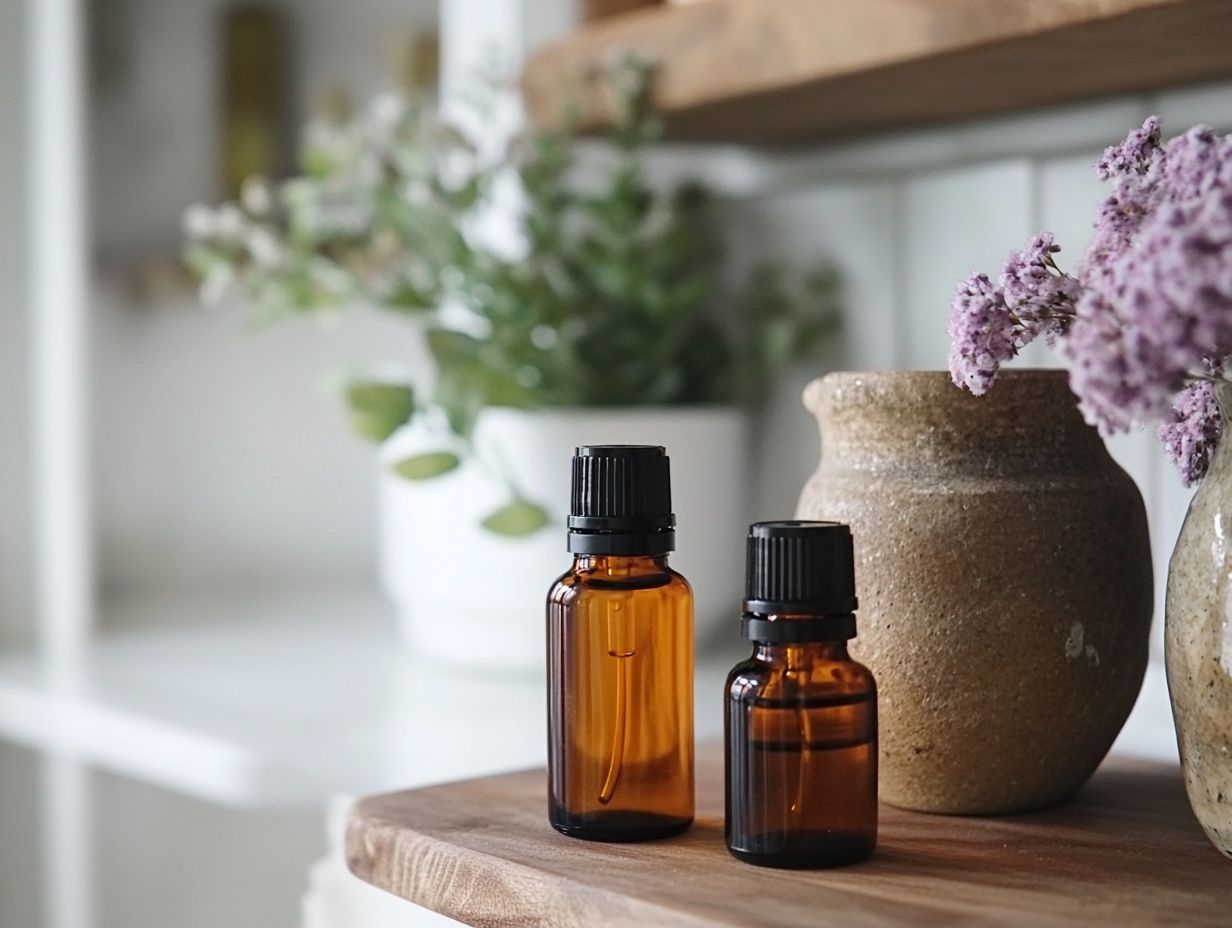
Certain essential oils are celebrated for their remarkable antibacterial properties, making them an excellent choice for your cleaning products.
Tea tree essential oil, lavender essential oil, and eucalyptus essential oil rank among the most effective options available. By incorporating these oils into your various cleaning formulations, you can effectively eliminate harmful bacteria while maintaining a chemical-free environment.
This not only enhances the effectiveness of your cleaning routine but also fosters a healthier living space.
The antibacterial prowess of these oils arises from their unique makeup, allowing them to disrupt bacterial cell membranes, ultimately leading to bacterial death.
For example, tea tree oil is particularly renowned for its potent antimicrobial activity. When mixed with water or vinegar, it creates a natural disinfectant perfect for surfaces.
Lavender oil introduces a delightful fragrance and helps to calm the atmosphere while combating pathogens. Eucalyptus oil is an outstanding choice for air purification, making it ideal for use in diffusers or cleaning sprays.
By utilizing the strength of these essential oils, you can maintain a clean environment that supports both your physical health and emotional well-being. Transform your daily routines into holistic practices that embrace the essence of nature, aligning with a sustainable, chemical-free lifestyle.
We encourage you to share your favorite essential oil blends or experiences in the comments below!
What Essential Oils Have Antifungal Properties?
Essential oils with antifungal properties, such as tea tree, lemon, and lavender essential oils, are effective for tackling mold and mildew. They are key additions to your cleaning routine, contributing to a chemical-free household while enhancing the freshness and safety of your environment.
Research has shown that these oils work well in various applications. By incorporating antifungal essential oils into your cleaning products, you can create a powerful natural solution for maintaining a clean and healthy home.
These natural extracts contain unique compounds that inhibit the growth of common household fungi, including Aspergillus and Penicillium. For instance, tea tree oil, known for its strong antifungal benefits, can be made into a diluted spray for cleaning moisture-prone areas like bathrooms and kitchens.
Lemon essential oil can also enhance your homemade cleaners, delivering antifungal benefits along with a burst of citrus freshness. By using these essential oils in your weekly cleaning tasks, you can significantly reduce the risk of mold, creating a safer and more inviting living space for everyone.
These DIY recipes help you clean naturally and effectively.
Incorporating certain essential oils known for their antiviral properties, like eucalyptus and tea tree oil, can enhance your cleaning regimen by adding extra protection against viruses. These oils naturally disinfect surfaces, contributing to a healthier home environment.
Adding these oils to your cleaning practices improves the effectiveness of your solutions and promotes your overall well-being. For more information, check out how to use essential oils for cleaning effectively. Be sure to follow proper safety tips and dilution guidelines when using essential oils.
Research shows that eucalyptus oil, a staple in aromatherapy, is particularly effective against pathogens due to its high concentration of 1,8-cineole, a compound known for its virus-fighting properties. Tea tree oil is also famous for its robust antimicrobial properties, making it a strong ally in eliminating various microbes from surfaces.
When you add these oils to your cleaning solution, you turn everyday cleaning into a more effective strategy against airborne and surface-borne viruses. Remember to consider dilution and perform a patch test on materials to avoid any damage, ensuring safety while maximizing the benefits of these powerful oils.
This is especially important for achieving non-toxic and pet-safe household cleaning practices.
How to Use Essential Oils in Cleaning?
Incorporating essential oils into your cleaning routine can be both simple and effective. These versatile oils blend seamlessly into a variety of DIY cleaning recipes, allowing you to create natural cleaning products that are safe for your home and loved ones.
Brands like AromaForce, Aura Cacia, Now, and Pure Essences offer high-quality organic essential oils perfect for these DIY cleaning recipes. Whether you re whipping up an all-purpose cleaner or a targeted solution for specific areas, essential oils serve many purposes.
Embracing these practices enhances the health of your living space and provides an opportunity for customization, allowing you to tailor scents and solutions to your preferences. Essential oils like lavender essential oil, lemon essential oil, and orange essential oil can be blended for effective and eco-friendly cleaning solutions.
1. All-Purpose Cleaner
An all-purpose cleaner made with essential oils is your secret weapon for tackling a variety of surfaces around your home. It combines the cleaning power of natural ingredients with delightful fragrances that elevate your cleaning routine.
By incorporating essential oils like tea tree essential oil, lavender essential oil, and lemon essential oil into your DIY cleaning recipes, you can craft an eco-friendly cleaning agent that not only disinfects but also leaves your home smelling fresh and inviting. These concentrated forms of essential oils provide a powerful aromatic punch.
This cleaner not only fights everyday dirt and grime but also has antibacterial properties that help eliminate harmful pathogens lingering on your surfaces.
To whip up your own blend, gather essential ingredients such as distilled water, white vinegar, and your chosen essential oils. When mixed, these components create a powerful cleaner safe for use in kitchens, bathrooms, and beyond. Explore essential oil blends to find the best combination for your needs.
Tea tree oil is celebrated for its germ-fighting qualities, while lavender contributes a soothing scent. Lemon oil enhances the cleaner’s ability to cut through grease. This harmonious combination ensures that your spaces will not only be spotless but also feel revitalized with every use.
2. Floor Cleaner
Creating a floor cleaner with essential oils presents you with an effective and aromatic method to keep your floors spotless, whether they re hardwood, tile, or laminate. By incorporating essential oils like eucalyptus essential oil and orange essential oil into your DIY cleaning recipes, you can achieve a thorough clean that brightens your floors while leaving behind a refreshing scent.
Beyond the delightful fragrances, essential oils bring natural antibacterial and antiviral properties, making them superb choices for sanitation.
To craft this all-natural floor cleaner, gather the following ingredients:
- 1 cup of vinegar
- 2 cups of water
- About 15-20 drops of your chosen essential oils
For maximum effectiveness, consider blending oils that boast their own unique benefits. Eucalyptus excels at disinfecting surfaces, while orange oil is known for its antibacterial properties.
Simply combine these ingredients in a spray bottle, give it a good shake, and apply to your floors using a microfiber mop. This solution will not only keep your home sparkling clean but also create an inviting atmosphere with every sweep.
3. Bathroom Cleaner
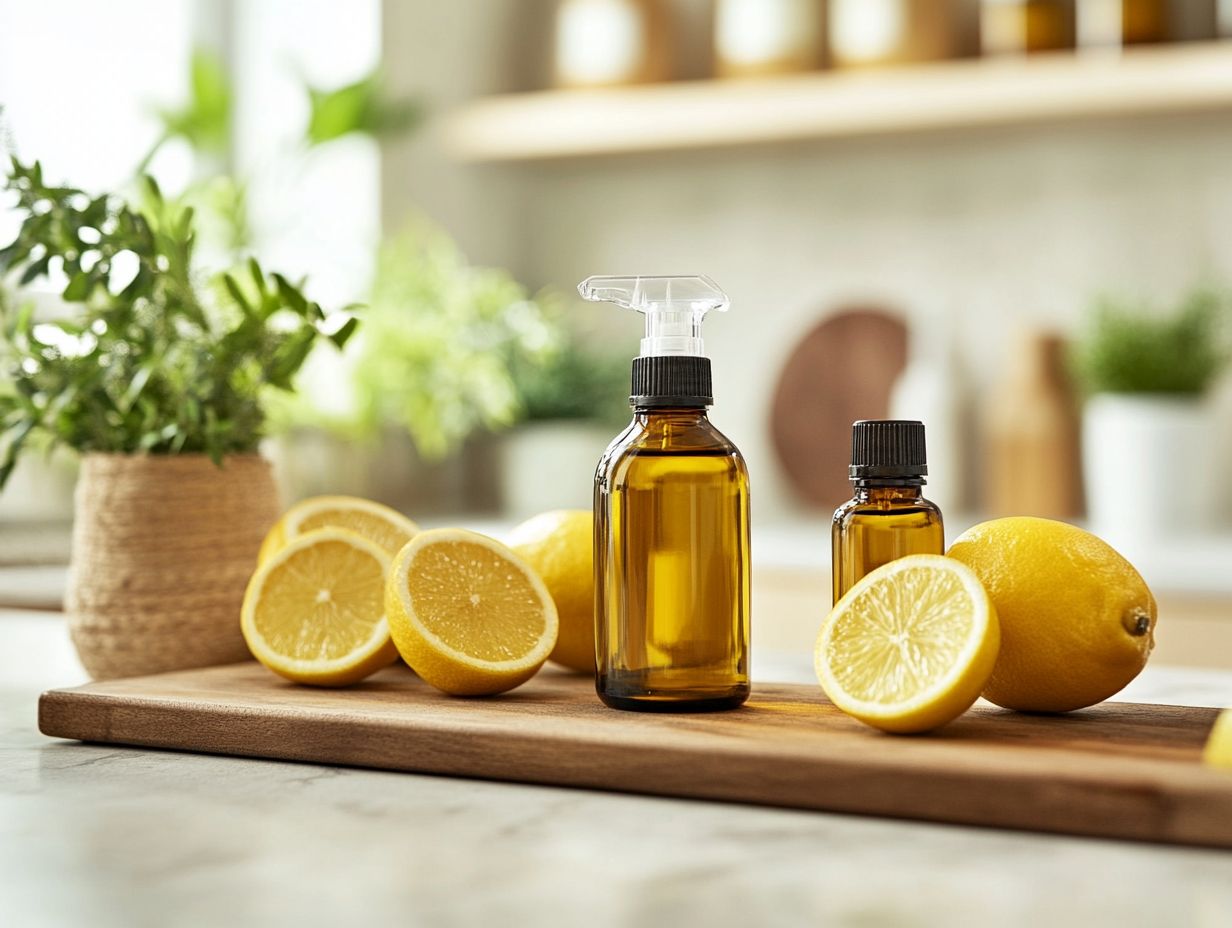
Transform your cleaning routine into an enjoyable experience with a bathroom cleaner crafted from essential oils. This blend effectively battles germs and mildew while filling your space with a delightful scent.
By incorporating essential oils like tea tree essential oil and lavender essential oil into your DIY cleaning recipes, you harness their antibacterial properties while adding a soothing touch to the often-daunting task of bathroom cleaning. These oils can often be found at a health food store and are part of why many essential oil enthusiasts opt for chemical-free cleaning methods.
Consider adding citrus oils such as lemon or orange to elevate your cleaner. These not only bring a fresh aroma but also enhance the formula with extra grease-cutting power.
For this simple yet effective cleaner, gather:
- one cup of distilled white vinegar
- one cup of water
- ten drops each of tea tree and lavender essential oils
Combine these ingredients in a spray bottle, give it a good shake, and spray it onto the surfaces. Allow it to sit for a few minutes before wiping clean. This natural concoction tackles soap scum and grime while leaving your bathroom revitalized with a refreshing scent, making it a delightful alternative to harsh chemical cleaners.
4. Air Freshener
Transform your space with an air freshener made from essential oils. It banishes unwanted odors and fills the air with uplifting scents that boost your mood. By incorporating essential oils like lemon essential oil and eucalyptus essential oil into your DIY cleaning recipes, you can create a natural air freshener that refreshes the environment while fostering a calming atmosphere in your home.
These essential oil recipes are great for use in scent diffusers or as part of herbal infusions to enhance your living space. With just a handful of simple ingredients, you can rejuvenate your home. Gather a spray bottle, some water, and your choice of essential oils lavender for relaxation or tea tree oil for its purifying qualities.
Begin by adding 10-15 drops of your selected essential oil into the spray bottle. Then, fill it nearly to the top with distilled water. Give it a gentle shake before each use to ensure the oils are well mixed. This method eliminates unpleasant odors and boosts your wellbeing. It creates a serene atmosphere that encourages mindfulness and reduces stress.
5. Laundry Freshener
A laundry freshener crafted with essential oils can elevate your laundry routine, infusing delightful scents while providing natural antibacterial benefits. By integrating essential oils such as lavender essential oil and orange essential oil into your DIY cleaning recipes, you can create a rejuvenating laundry booster that not only leaves your clothes smelling exquisite but also supports a chemical-free wash.
Such essential oil blends are perfect for tackling seasonal allergies and ensuring pet safety in your home. Embracing these natural fragrances enhances the overall freshness of your laundry and effectively tackles stubborn odors that traditional fabric softeners often merely mask.
This simple yet impactful approach allows you to experience the soothing effects of lavender or the invigorating brightness of orange. Transform the often mundane chore of doing laundry into a more pleasurable endeavor.
To create your own laundry freshener, gather the following ingredients:
- 1 cup of water
- 1 cup of white vinegar
- 10-20 drops of your preferred essential oils
Combine these elements in a spray bottle, and use this blend in your dryer or as a refreshing spritz on freshly cleaned clothes. The result is not only a delightful fragrance but also a natural method to keep your fabrics germ-free and fresh, enhancing the well-being of your living space.
Are There Any Safety Precautions When Using Essential Oils in Cleaning?
When incorporating essential oils into your cleaning routine, it s vital to consider specific safety precautions to create a safe and effective environment. Key factors such as proper dilution, awareness of health concerns, and the suitability of particular essential oils around children and pets are essential in crafting a responsible cleaning approach.
Embrace these safety tips to enjoy the full benefits of essential oils without worry. By following these guidelines, you can savor the advantages of essential oils while minimizing any potential risks.
What Essential Oils Should Be Avoided Around Children and Pets?
You should exercise caution when it comes to certain essential oils around children and pets due to potential health risks. Oils like eucalyptus, peppermint, and tea tree can pose significant dangers if not used correctly. It s crucial to read up on safety tips and consult reputable recommendations when integrating essential oils into your cleaning routine. This ensures a safe haven for both your family and furry companions. Opt for pet safe and safe oils to mitigate any health issues.
Take eucalyptus oil, for example it can trigger respiratory issues in young children and is toxic to cats if ingested. Peppermint oil, while refreshing, is known to irritate sensitive skin and can lead to digestive distress in pets when consumed. Then there s tea tree oil, which, despite its popularity for antiseptic properties, can be harmful to both cats and dogs, even in small amounts. It can potentially cause grooming issues or problems with the nervous system. This is why using properly diluted oils is crucial for creating pet-safe cleaning solutions.
To create a secure environment, always keep essential oils out of reach to protect your little ones and pets. Use them in well-ventilated areas, and consider alternatives specifically designed to be safe for households with small children and pets. By following these precautions, you can enjoy the wonderful benefits of essential oils while keeping your loved ones safe!
How to Properly Dilute Essential Oils for Cleaning?
Properly diluting essential oils is essential for ensuring your cleaning endeavors are both safe and effective. Concentrated oils can lead to irritation or unwanted reactions if mishandled. A good rule of thumb is to mix essential oils with substances used to dilute essential oils, like water or vinegar, using appropriate ratios tailored to your specific cleaning needs. By following these safety guidelines, you can fully enjoy the benefits of natural cleaning products while minimizing any potential risks.
To achieve optimal cleaning results, you should adhere to specific dilution ratios. For instance, when utilizing essential oils for surface cleaning, a common recommendation is to use 10-15 drops of oil per cup of water or vinegar. This mixture delivers a potent yet safe cleaning solution. If you are focusing on disinfecting, consider a stronger concentration of 20 drops per cup, especially with oils renowned for their antibacterial properties, such as tea tree or lavender. For more comprehensive guidance, check this quick guide to essential oils for cleaning. Just remember to perform a patch test on surfaces first to avoid any damage.
It’s also wise to wear gloves when handling concentrated oils to protect your skin. Thoughtful dilution not only enhances the effectiveness of your cleaning efforts but also prioritizes your health and the environment.
Frequently Asked Questions
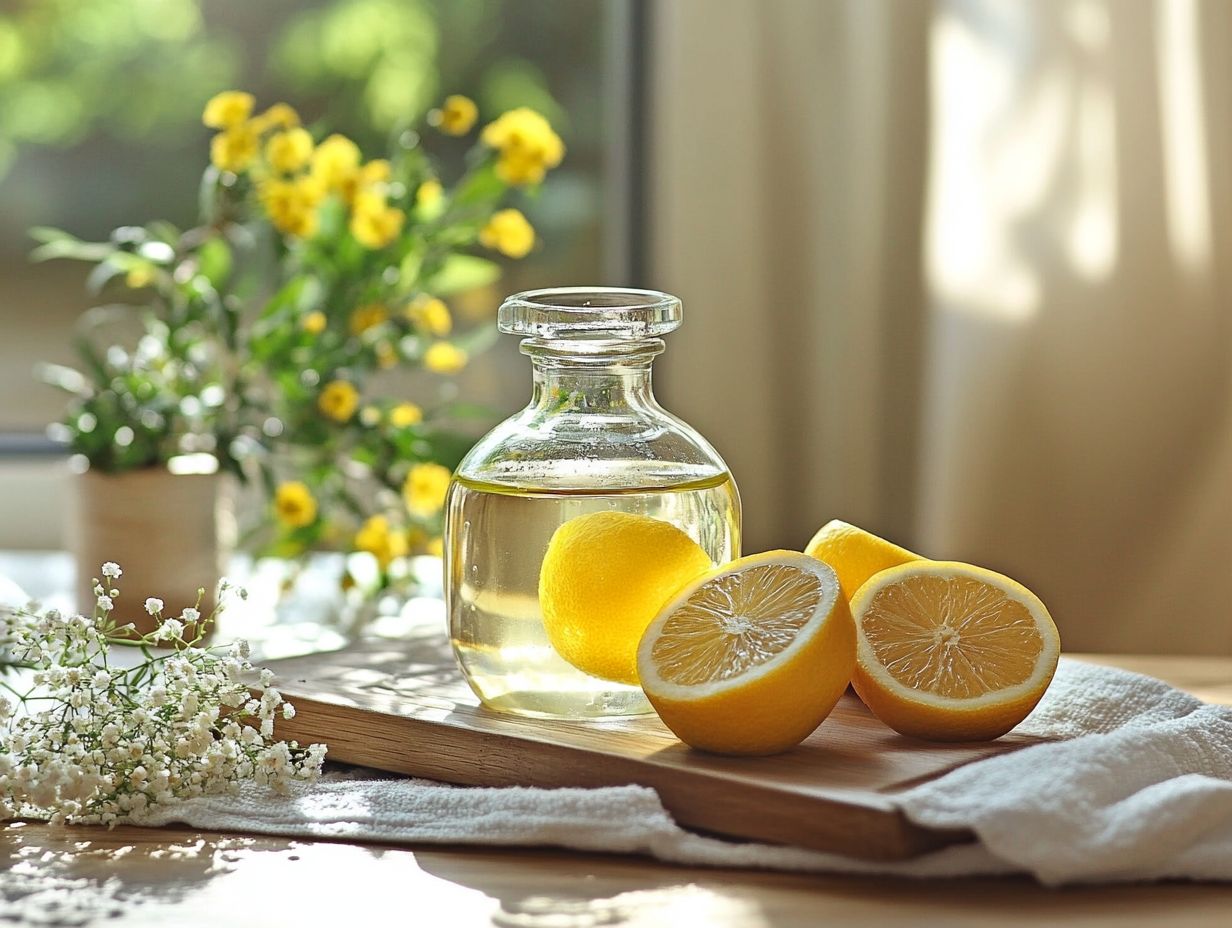
Are essential oils a good fit for my cleaning routine?
Yes, essential oils can be a great addition to your cleaning routine. They have natural cleaning and disinfecting properties and can also leave a pleasant scent behind.
How do I use essential oils in my cleaning routine?
There are a few different ways you can use essential oils in your cleaning routine. You can add a few drops to your homemade cleaning solutions, sprinkle them on your cleaning cloths, or even use them in a diffuser to freshen up the air while you clean.
Which essential oils are best for cleaning?
Some of the best essential oils for cleaning include lemon, tea tree, eucalyptus, and lavender. These oils have natural antibacterial and antiviral properties that make them effective for disinfecting surfaces.
How much essential oil should I use in my cleaning solutions?
The amount of essential oil to use in your cleaning solutions will depend on the solution and the oil being used. As a general rule, 5-10 drops of essential oil per 1 cup of water is a good starting point. However, you can adjust this ratio to your personal preference.
Are essential oils safe to use around children and pets?
While essential oils can be safe for use around children and pets, it’s important to use caution and do your research. Some oils can be toxic to animals, and certain oils may cause irritation or allergic reactions in children. Always dilute oils and use in well-ventilated areas when using around children and pets.
Can I use essential oils on all surfaces?
Essential oils can bring wonderful scents and benefits to your home. However, test it on a small area first to ensure safety.
Some surfaces, like wood or granite, may react to certain oils and could be damaged. Avoid using essential oils on plastic; they can cause damage or discoloration.
Explore the amazing world of essential oils safely!

